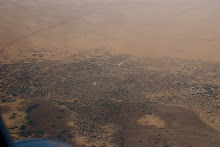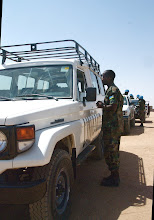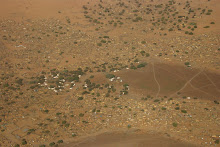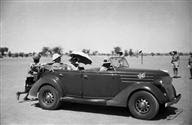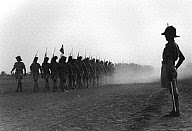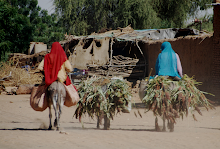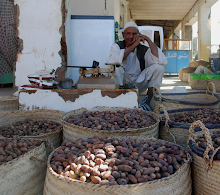The Shoe/Bush incident is the talk of the town. The Sudanese I spoke to let out an involuntary peal of laughter the first time they saw or heard, but quickly assumed disapproving expressions. The Sudanese, they claim, are quieter, more restrained, particularly in the face of authority. You would never see a Sudanese throw a shoe at anyone, they tell me.
(But when I ask why it is bad or good to throw shoes I get answers like ‘its bad because then the authority will be angry and it will make your life more difficult.’ It seems when life is already of a certain degree of difficulty, morality falls away and all that’s left are practical concerns.)
To me the footage is only meaningful with the sound on. The visual image is just an angry man. But the audio of Bush being cut off in mid-sentence – proclaiming friendship and ‘parting gifts to the Iraqi people’ - with a loud thud lends an ‘emperor’s new clothes’ side to the story. A lone man standing up for truth.
Its one thing for leaders to make foreign policy mistakes or at least to watch major unintended consequences of their actions unravel. But its another thing to pretend its not happening.
The Bush incident was embarrassing to many Iraqis (and Sudanese). But not nearly as embarrassing as Bush’s State of the Middle East Speech a week earlier was to me. I keep telling my Sudanese friends that Americans are more honest than that, more down-to-earth. That you would never see a true American stand before a wounded country and say things not remotely connected to reality.
Saturday, December 27, 2008
Lessons from the Peace Corps
I was a Peace Corps volunteer before joining the UN. In training, a few weeks into your stay in a new country, they make you do an exercise called “community mapping” to learn the two most essential skills of community intervention.
The trainers drive you out to a small village, assemble the villagers, give you a pen and paper and tell you to sketch out a map of the existing village structures and services and identify needs for new ones.
Half the battle is explaining to a group of unsuspecting villagers who you are and what it is you are doing standing in the dirt in front of them with a pen and paper. The rest of the battle is learning how to listen. Vast differences between you and them soon become apparent – perhaps you don’t know what a gari mill is, and they definitely have no idea how to conceive of a map. Somehow you have to meet in the middle.
The point of this story is that UNAMID needs to get better at 1) explaining what it is and why it is there, and 2) relaying messages back from the community about what their needs are. This two-way communication is supposed to happen on daily “confidence building patrols” which consist of a few cars of police and military personnel driving around camps and villages and stopping to talk to people. These patrols constitute the vast majority of UNAMID’s billion-dollar-a-year contact with its constituency - rural Darfuris affected by the conflict.
But very little has been invested in developing these essential skills in police and military and in the translators through which their interactions are channeled. Going along on patrol you can’t help but notice some camp residents give blank stares in response to questions – they don’t know why UNAMID people are there and what they expect to offer. Others say everything is fine, having long ago given up hope that anyone is actually listening to what they say..
If you can’t communicate, you’re just someone with a pen and paper in the dirt.
The trainers drive you out to a small village, assemble the villagers, give you a pen and paper and tell you to sketch out a map of the existing village structures and services and identify needs for new ones.
Half the battle is explaining to a group of unsuspecting villagers who you are and what it is you are doing standing in the dirt in front of them with a pen and paper. The rest of the battle is learning how to listen. Vast differences between you and them soon become apparent – perhaps you don’t know what a gari mill is, and they definitely have no idea how to conceive of a map. Somehow you have to meet in the middle.
The point of this story is that UNAMID needs to get better at 1) explaining what it is and why it is there, and 2) relaying messages back from the community about what their needs are. This two-way communication is supposed to happen on daily “confidence building patrols” which consist of a few cars of police and military personnel driving around camps and villages and stopping to talk to people. These patrols constitute the vast majority of UNAMID’s billion-dollar-a-year contact with its constituency - rural Darfuris affected by the conflict.
But very little has been invested in developing these essential skills in police and military and in the translators through which their interactions are channeled. Going along on patrol you can’t help but notice some camp residents give blank stares in response to questions – they don’t know why UNAMID people are there and what they expect to offer. Others say everything is fine, having long ago given up hope that anyone is actually listening to what they say..
If you can’t communicate, you’re just someone with a pen and paper in the dirt.
The ICC and the US
I keep seeing editorials in respectable newspapers exhorting the US government to act to ensure that justice is not delayed in Darfur through a Security Council deferral of the arrest warrant for President Bashir.
A group of prominent Darfur experts wrote an open letter to Barrack Obama claiming that since Briton and France were negotiating with Sudan over the charges – trying to leverage major concessions in exchange for a deferral - the US must step into the moral vacuum and ensure that justice prevails, presumably in order to prevent dictators around the world from thinking they are immune to war cirmes charges.
Which would all sound a lot better if the US had not shied away from ratifying the Rome Statue creating the ICC for fear that its people would not be immune from war crimes charges.
Condilezza Rice has just outlined an expensive step by step plan for strengthening international justice mechanisms. But the single most meaningful gesture the US could carry out to strengthen the legitimacy of the charges against President Bashir and to raise the stakes of continued defiance of the law by the Sudanese government is to ratify the court's documents.
A group of prominent Darfur experts wrote an open letter to Barrack Obama claiming that since Briton and France were negotiating with Sudan over the charges – trying to leverage major concessions in exchange for a deferral - the US must step into the moral vacuum and ensure that justice prevails, presumably in order to prevent dictators around the world from thinking they are immune to war cirmes charges.
Which would all sound a lot better if the US had not shied away from ratifying the Rome Statue creating the ICC for fear that its people would not be immune from war crimes charges.
Condilezza Rice has just outlined an expensive step by step plan for strengthening international justice mechanisms. But the single most meaningful gesture the US could carry out to strengthen the legitimacy of the charges against President Bashir and to raise the stakes of continued defiance of the law by the Sudanese government is to ratify the court's documents.
End of a Long Silence
I haven’t written in a long time, I apologize – I’ve been traveling a lot and I lost my USB drive with all my rambling writings somewhere in the sand. Its Christmas time now, and things have settled down a bit. Most people are on holiday.
President Bashir came to El Fasher yesterday. The weeks leading up were filled with frantic preparation – painting the curbs black and white, hanging Sudanese flags along the road, rushing to finish construction on the new mosque, military hospital, and ministry buildings. The frenzy of activity built up until the night before when hundreds of workers were still putting up power lines, sweeping the streets, and hammering – I half expected to wake up the next day in a reformed city, with shiny cars, nice buildings, and people singing in the streets.
Bashir’s arrival after all the preparation was anticlimactic, despite the significantly increased amount of armed men careening about town in pick-up trucks. He gave a speech promising peace and a new road to Khartoum, but my Sudanese colleagues were unimpressed.
The most drama occurred when residents of the displaced persons’ camp refused to allow Bashir’s convoy to pass by the camp on its way to the “model village” he was opening and inviting them to live in - so he had to travel the two kilometers by helicopter.
President Bashir came to El Fasher yesterday. The weeks leading up were filled with frantic preparation – painting the curbs black and white, hanging Sudanese flags along the road, rushing to finish construction on the new mosque, military hospital, and ministry buildings. The frenzy of activity built up until the night before when hundreds of workers were still putting up power lines, sweeping the streets, and hammering – I half expected to wake up the next day in a reformed city, with shiny cars, nice buildings, and people singing in the streets.
Bashir’s arrival after all the preparation was anticlimactic, despite the significantly increased amount of armed men careening about town in pick-up trucks. He gave a speech promising peace and a new road to Khartoum, but my Sudanese colleagues were unimpressed.
The most drama occurred when residents of the displaced persons’ camp refused to allow Bashir’s convoy to pass by the camp on its way to the “model village” he was opening and inviting them to live in - so he had to travel the two kilometers by helicopter.
Subscribe to:
Posts (Atom)

